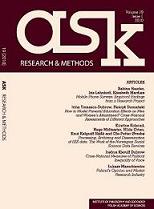How to Model Parental Education Effects on Men and Women’s Attaintment? Cross-National Assessments of Different Approaches
How to Model Parental Education Effects on Men and Women’s Attaintment? Cross-National Assessments of Different Approaches
Author(s): Irina Tomescu-Dubrow, Henryk DomańskiSubject(s): Social Sciences
Published by: Instytut Filozofii i Socjologii Polskiej Akademii Nauk
Keywords: intergenerational transmission of family resources; measurement of social
Summary/Abstract: Research in social stratifi cation shares the assumption that social origin operates through assets embedded in the family structure, yet scholars’ opinions of how resources get transmitted intergenerationally vary signifi cantly. The result of this variation in opinions is a range of measures for family background, and distinct empirical models. A simplifi ed schema yields three main methodological approaches: (a) one parent’s characteristics models; (b) models using characteristics of both parents; and (c) models accounting for specifi c effects of social origin depending on gender. In this paper we analyze how models of each type perform when applied to cross-national data from the European Social Survey (Round 3). We focus on the impact of parental education on children’s success, while controlling for parents’ social class position. Individual success is conceptualized primarily in terms of educational attainment, but also of occupational standing. Although our analyses do not disclose consistent patterns across all studied countries -- neither of the models performs uniformly better, or worse, in majority of countries – some regularities are noticeable. In particular, with respect to explaining educational attainment, we fi nd that it is generally preferable to include measures for both parents’ education, rather than use one parent’s characteristics models. The best fi tting model – in terms of explained variance – is that combining father’s and mother’s education by including an interaction term of these variables. In the case of occupational standing, we generally consider the model that accounts for father’s and for mother’s education as the preferred solution – at least when direct effects are statistically signifi cant. In addition, the hypothesis that the intergenerational transmission of parental education affects men and women differently is, in light of these outcomes, supported only in some of the countries.
Journal: ASK. Research & Methods
- Issue Year: 2010
- Issue No: 19
- Page Range: 21-50
- Page Count: 29
- Language: English

